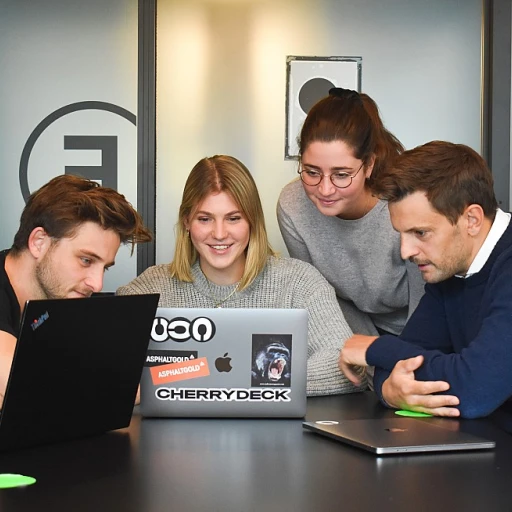Understanding MSP Staffing in Nonprofits
Grasping the Concept of MSP Staffing in Nonprofits
MSP staffing, or Managed Service Provider staffing, plays a pivotal role in the nonprofit sector. Nonprofit organizations, from arts programs to health services in Columbus, Ohio, often collaborate with consulting agencies to streamline their operations. These partnerships help in areas like strategic planning, community initiatives, and business development. Understanding MSP staffing is crucial, as it ensures that nonprofits can focus on their core mission rather than get bogged down by staffing issues.
In essence, MSP staffing involves outsourcing the management responsibilities and functions of an organization’s workforce. This service provides nonprofits with the expertise and flexibility they may lack internally due to limited resources. In Columbus, consulting services tailored for nonprofits help manage tasks like project management, executive director search, and fundraising consulting. By leveraging the expertise of nonprofit consulting agencies, organizations can align their staffing strategies with their mission goals.
The city of Columbus and the state of Ohio offer a dynamic environment for nonprofits. With prominent institutions like Ohio State University and various development centers, there is a robust framework for nonprofit development and staffing. Agencies in Central Ohio, such as those specializing in fundraising like Mollard Consulting, provide delivery of consulting services that bridge any gaps in nonprofit staffing. Whether it’s managing food pantry programs or organizing community arts events, MSP staffing solutions bring about effective management and execution of nonprofit projects.
Moreover, nonprofits can benefit from community connections and collaborations. Organizations like business associations and humane societies across Columbus and Franklin County frequently engage in consulting profit partnerships, where strategic planning and program management are optimized through MSP staffing.
In examining how nonprofits utilize MSP staffing, it's also important to consider how agencies help overcome key challenges. Nonprofit organizations in the United States face unique hurdles, and understanding the dynamics of management through MSP staffing is essential for success.
Key Challenges in MSP Staffing for Nonprofits
Addressing Staffing Complexities in Nonprofit Sectors
Nonprofit organizations in Columbus, Ohio, face unique challenges when it comes to Managed Service Provider (MSP) staffing—stemming largely from their reliance on limited budgets and specific skill requirements. Here's a closer look at some of the hurdles these nonprofits encounter:- Resource Constraints: Many nonprofits, including those involved in arts, community health, and the environment, operate under tight financial constraints. This makes it difficult to allocate sufficient resources for staffing, especially when considering the vital roles like those in fundraising, program development, and strategic business planning.
- Diverse Staffing Needs: Nonprofits often need a diverse set of skills ranging from fundraising consulting, community outreach development, to specialized project management. Whether it’s supporting a local food pantry or running a statewide campaign from the Ohio State University, skilled personnel are crucial.
- Volunteer Reliance: With a heavy reliance on volunteers, nonprofits must strategically balance paid MSP staffing for core functions while ensuring volunteers adequately support community programs. This balancing act is particularly evident in organizations like the humane society or central Ohio’s various nonprofit associations.
- Regulatory and Compliance Challenges: Nonprofits operate in a web of regulatory requirements that regularly change, thus necessitating expertise in compliance. This is crucial for organizations in areas such as health services or those associated with the Franklin County jurisdiction.
- Talent Retention and Development: Retaining talent is another major challenge, as nonprofits need to compete with private sector jobs that typically offer more lucrative compensation packages.
Strategies for Effective MSP Staffing
Enhancing MSP Effectiveness for Nonprofit Impact
Developing a formidable Managed Service Provider (MSP) strategy is crucial for nonprofits striving to heighten their impact in communities like Columbus, Ohio. To achieve this, organizations need a combination of tailored solutions and strategic planning. Here are a few key strategies to enhance the effectiveness of MSP staffing for nonprofits:
1. Strategic Planning and Management: Effective strategic planning is essential for aligning the goals of the nonprofit with the capabilities of the MSP. Organizations such as arts associations, health groups, or community foundations can benefit from tailored consulting services which highlight strategic alignment, ensuring resources are effectively allocated. For example, partnering with esteemed Columbus centers like Ohio State University for workshops on strategic planning can enhance an organization’s ability to adapt to changing needs.
2. Leveraging Local Resources: Working with local consulting firms like those found in Columbus can provide specific insights into the community’s needs. Nonprofits, such as food pantries or the humane society, can benefit from these partnerships by ensuring that their MSPs are acutely aware of local challenges and opportunities, from business development to fundraising initiatives.
3. Focus on Specialized Services: Nonprofits often need specialized MSP services such as project management, fundraising consulting, and program development. Consulting firms in Central Ohio, like Mollard Consulting, are equipped to customize these services to better support nonprofit organizations. This approach ensures the MSP model is not a one-size-fits-all but rather tailored to the unique mission of each organization.
4. Continuous Training and Development: Encouraging continuous development for staff involved in MSP operations can significantly enhance effectiveness. Partnering with local universities for workshops and training programs can benefit nonprofit staff greatly, ensuring they are up-to-date with the latest management and operational strategies.
By implementing these strategies, nonprofits in Columbus Ohio can create a robust framework for their MSP staffing, maximizing their reach and impact. Consultants and strategic planners can serve as invaluable partners in this process, equipping these organizations to better serve their missions and their communities.
Case Studies of Successful MSP Staffing in Columbus
Successful Implementations of Managed Service Provider Models in Columbus
The implementation of Managed Service Provider (MSP) models within nonprofit organizations in Columbus, Ohio has seen a remarkable trend, reflecting a shift towards better resource allocation and efficiency. Several nonprofits have successfully adopted these strategies to enhance their operations. In Franklin County, a prominent food pantry collaborated with a consulting agency specialized in strategic planning and management. By leveraging MSP staffing, they optimized their volunteer management, leading to a significant increase in the number of families served. The nonprofit was able to streamline its services and improve community outreach programs. Another example includes a local arts organization in Columbus that partnered with fundraising consulting agencies. The implementation of an MSP model allowed them to enhance their project management capabilities, resulting in successful fundraising events and increased community engagement. This collaboration not only aided in business development but also strengthened their ties with local businesses and cultural centers. At the Ohio State University, various nonprofit initiatives have benefited from consulting services that focus on executive director training and development. By employing MSP strategies, these initiatives have effectively enhanced their management skills, fostering better organizational growth and stability. This approach has also been instrumental in securing additional funding from foundations and associations dedicated to supporting educational and health-related projects. Mollard Consulting, a key player in the Columbus nonprofit sector, has demonstrated expertise in aligning organizational goals with community needs. Through the use of MSP staffing models, they have successfully supported nonprofit organizations in achieving sustainable development, notably in areas such as humane society programs and strategic business initiatives across Central Ohio. These case studies exemplify the potential of MSP staffing to drive nonprofit success in Columbus. They highlight the strategic partnerships and community-centered approaches pivotal for long-term impact and organizational health.Choosing the Right Nonprofit Consulting Agency
Selecting an Optimal Nonprofit Consulting Partner in Columbus
Choosing the right nonprofit consulting agency can be a pivotal step for organizations striving to enhance their MSP staffing capabilities. Columbus, Ohio, boasts a diverse array of consulting services that cater specifically to nonprofit needs. These agencies bring substantial value to the table by offering strategic guidance and project management, helping nonprofits achieve their mission more effectively.
When scouting for an optimal partner, consider their understanding of the local landscape, including familiarity with community needs and dynamics. It's essential that they not only possess expertise in your sector, such as health or arts, but also demonstrate an ability to connect with the broader community ecosystem. Key players might have ties with entities like Franklin County’s health and development organizations or the Ohio State University's resources, which are crucial for broadening your nonprofit's reach and impact.
The right consulting agency should offer services aligned with your specific requirements. This includes tactical support in strategic planning and business development, as well as fundraising consulting that can bolster your financial foundation. Agencies skilled in these areas can be invaluable, whether you’re a community food pantry or a large arts association seeking to expand your program offering.
Other considerations may involve evaluating the firm’s past engagements with similar nonprofit organizations. Case studies of successful MSP staffing in Columbus provide practical insights and benchmarks of what to expect. Furthermore, collaboration opportunities with entities like Mollard Consulting or Aly Sterling Philanthropy can offer tailored solutions that significantly enhance your operational efficiency.
Additionally, ensure the consulting agency exhibits a solid track record in handling challenging scenarios typical to nonprofit environments. This includes adaptability to various services, from executive director leadership training to program development, ensuring they can meet unique organizational needs.
In summary, aligning with a consulting partner in Columbus, Ohio, that offers profound expertise, extensive community ties, and a comprehensive service portfolio is paramount. This strategic partnership can serve as a cornerstone in overcoming staffing hurdles and achieving your nonprofit's goals swiftly and effectively.
Future Trends in MSP Staffing for Nonprofits
The Shifting Landscape of Managed Service Provider Staffing in Nonprofits
As the realm of nonprofit organizations continues to evolve across Columbus, Ohio, the strategies surrounding Managed Service Provider (MSP) staffing are poised for transformation. Nonprofits must remain vigilant, adapting to emerging trends to ensure they effectively leverage their resources and maximize impact.
Several key developments could shape the future of MSP staffing in nonprofit settings:
- Integration of Advanced Technology: The adoption of innovative technologies is critical for enhancing efficiency and effectiveness in nonprofit operations. Future Msps may increasingly incorporate tools such as AI and data analytics to streamline processes, improve decision-making, and enhance community outreach.
- Focus on Specialized Services: As nonprofits diversify and expand their offerings, the demand for specialized consulting services will grow. Expertise in areas such as fundraising consulting and strategic planning will become indispensable to address complex challenges.
- Collaboration and Partnerships: Building strategic alliances with local entities, like Ohio State University or Franklin County community bodies, provides access to resources, expands reach, and strengthens community ties. Effective partnership development will be essential in leveraging shared goals.
- Sustainability and Social Responsibility: Emphasizing sustainable practices and social responsibility is becoming a critical component of nonprofit initiatives. Managed services will need to align with these principles, ensuring that projects and programs are not only successful but also ethically sound.
- Evolving Workforce Dynamics: Shifts in workforce expectations, particularly the growing emphasis on remote work and flexible arrangements, will influence how nonprofits approach staffing. Transitioning to more adaptive staffing models allows organizations to meet these changing needs.
Given the complex landscape in Columbus, nonprofits will benefit from working with experienced consulting agencies, such as those providing tailored services for arts, health, or food pantry projects. Agencies that keep pace with industry trends and focus on the unique requirements of nonprofit organizations stand to make a significant impact.
As nonprofits grapple with these developments, those who embrace the future of MSP staffing will be best positioned to drive their missions forward and foster sustainable growth within their communities.








